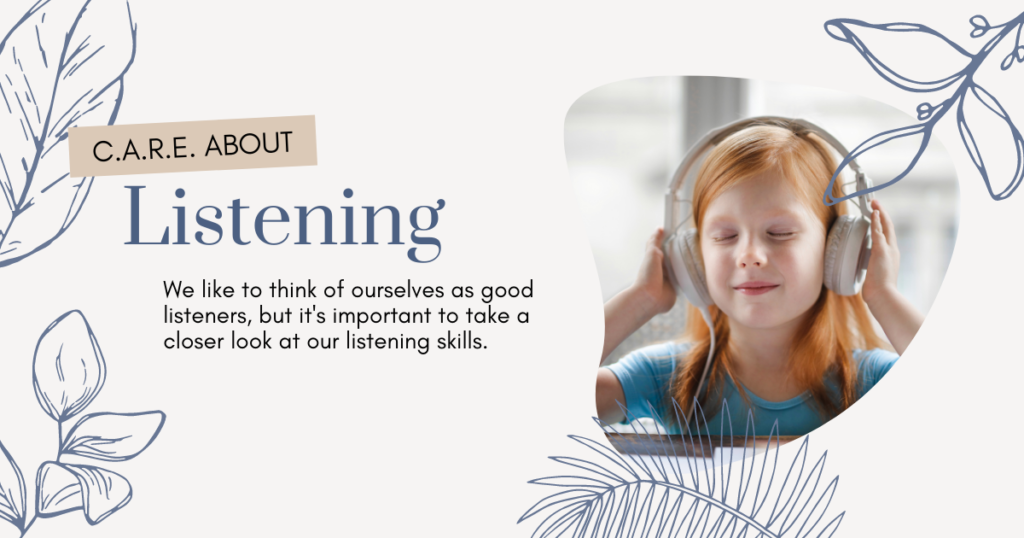We like to think of ourselves as good listeners, but it’s important to take a closer look at our listening skills. Listening is a key component of assessment. We need to discover the patient’s history, their chief complaints, and their observations and reports about their symptoms. There are a number of types of listening, and it’s important to be able to identify them. We might: not be listening, we might listen from habit, listen to form a response, listen with an open mind, listen with an open heart, and listen with compassion – being fully present.
Not Listening
Sometimes we have to admit we’re not actually listening at all. We may think that we can look at the phone, answer emails, check the news, look at social media posts all the while carrying on a conversation. But the reality is, we really can’t do all of that at the same time. Our modern life has created an erosion of our attention spans – some reports even claim that we have attention spans shorter than a goldfish! And we have the pressure of marketers competing for our attention. In a sense, our attention is the commodity that they most covet. Recapturing our attention, and learning to not be so easily distracted for ourselves would add to our quality of life.
Listening Out of Habit
Sometimes we listen out of habit. Maybe we think we’ve heard the same thing so many times, we know what comes next. Maybe we’re mind reading since we don’t really trust that they know what they’re saying, and we’re going to correct their narrative. We are being disrespectful when we do this. You may have seen some of the videos on social media of nurse influencers who tease and mock the various types of nurses giving report: the confused one, the disorganized one, the too many details one, the not enough detail one, and so on. Anytime we think we can pigeon hole someone, we risk listening out of habit. This can trip us up when something new is added, or we’re caught not really listening.
Listening with compassion changes everything
Listening to Form an Argument
We may have been guilty of listening in order to form an argument or other response. We’re assuming that we know what they’re going to say. We know we disagree, so we want to be ready with a clever retort. Or, we can’t wait to share our similar experience with them, defeating their desire to share their feeling or experience with us, only to have us say, “Oh, I know exactly how you feel. That happened to me, too!”
Listening With an Open Mind
Other ways to listen, include listening with an open mind – we’re willing to learn. We take in new information, asking questions to clarify and note differences. During a patient assessment, this quality is especially important. We may find that sometimes the way a patient describes their symptoms doesn’t match the way we in the medical field would. You may have had a patient who denies that they have any pain, yet you can see them guarding the injured part, or grimacing when they’re moved or touched. When we ask what it feels like, they may describe a “deep ache,” or “like a hot poker,” or “pins and needles.” They don’t consider it “pain,” yet they do need pain management for their somatic, neurologic, or visceral pain.
Listen With an Open Heart
We can also listen with an open heart. We can see through the other person’s eyes, making an emotional connection. We set aside our personal point of view for a moment in order to understand that, while their response to a situation might be different from ours, it is their truth. Our open heart helps us to recognize their feelings, and to be able to process and restate our understanding of their feelings.
Listening With Compassion
Listening with compassion means that we’re fully present with the other person. We’re calm and have the stability needed to be with them, even when they’re in a lot of pain; even when we’re feeling uncomfortable. An old habit might be to try to fix. In Brené Brown’s video on empathy, she talks about us trying to put a silver lining around their pain by fixing things or diverting their attention. When that happens, it’s important to take a breath, reconnect with ourselves, and recognize what’s happening within us. Then we can return to listening and being present with the patient. We’re willing not to have the answers or try to fix the problem, but we’re partnering with them to companion them on their journey.

